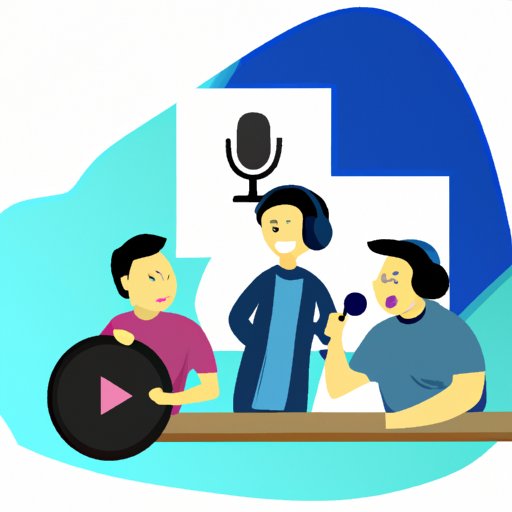Introduction
The concept of “free music” has been around since the advent of recorded music. But in recent years, with the rise of digital platforms, music has become increasingly available for free. This article will explore how music got free, the impact it has had on the music industry, musicians, and consumers, as well as the role of technology in making music free.
Historical Overview of Music Piracy and How It Became Free
Music piracy is defined as the unauthorized copying and distribution of copyrighted music. It has been around since the invention of audio tape recording in the 1950s, when people would record songs from the radio onto tapes and then share them with friends. In the 1980s, the introduction of the Compact Disc (CD) made it easier to copy music without any loss of quality. This led to the emergence of CD-R burning technology, which allowed users to create perfect copies of CDs and share them with others.
The development of the Internet in the 1990s was a major turning point in the history of music piracy. Online file sharing services such as Napster, Kazaa, and Limewire made it possible for anyone with an Internet connection to access and download music for free. As a result, the music industry experienced a dramatic decline in sales, with global music sales dropping by 25 percent between 1999 and 2002.
According to research conducted by the International Federation of the Phonographic Industry, “piracy has had a massive impact on the music industry, costing it billions of dollars in revenue each year.” The study found that in the US alone, music piracy resulted in a $12.5 billion loss in revenue between 2000 and 2009.
An Examination of the Pros and Cons of Free Music
While free music has its advantages, there are also some drawbacks. Let’s take a look at the pros and cons of free music.
Advantages of Free Music
One of the main benefits of free music is that it increases accessibility. People no longer have to buy physical copies of albums or pay for downloads to listen to their favorite artists. This makes it easier for new music to reach a wider audience, allowing independent artists and lesser-known acts to gain exposure.
Furthermore, free music helps to reduce the cost of entry for new artists. Instead of spending thousands of dollars on studio time and production costs, they can distribute their music online for free and still be heard. As a result, more people are able to pursue their dreams of becoming a musician.
Disadvantages of Free Music
On the other hand, free music has its drawbacks. One of the biggest issues is that it devalues music. When music is given away for free, it sends a message that it has no value. This can lead to lower sales and decreased revenue for artists, record labels, and other industry professionals.
In addition, free music can lead to a decrease in the quality of music being produced. Without the necessary funds to invest in high-quality production, many artists are forced to release music of a lower quality. This can lead to a decrease in musical innovation and creativity, as artists are not incentivized to push boundaries and experiment with their sound.

Exploring the Impact of Free Music on the Music Industry
Free music has had a significant impact on the music industry. Here we will examine the effects it has had on record labels and musicians.
Effects on Record Labels
Record labels have been hit particularly hard by the rise of free music. According to a study by the RIAA, the number of independent record labels in the US dropped from 1,400 in 2000 to fewer than 500 in 2010. This can be attributed to the fact that record labels are unable to recoup their investments due to the prevalence of free music. As a result, many labels have gone out of business or have been forced to scale back their operations.
Effects on Musicians
Musicians have also been affected by the rise of free music. While some artists have benefited from increased exposure, most have seen their income drop significantly. A report by the Future of Music Coalition found that the average income for a professional musician dropped from $21,800 in 1999 to $16,500 in 2014. This can be attributed to the fact that there are fewer opportunities for musicians to make money from their music, as many consumers are now accessing it for free.
Investigating the Impact of Free Music on Consumers
Free music has had a significant impact on consumers as well. Let’s take a look at how it has changed the way people access and consume music.
Increased Accessibility
One of the main benefits of free music is that it has increased accessibility. Consumers no longer have to purchase physical copies of albums or pay for downloads to listen to their favorite artists. This has allowed people to discover new music more easily and has opened up the door for independent artists to gain exposure.
Quality of Music
Another issue with free music is that it can lead to a decrease in the quality of music being produced. Without the necessary funds to invest in high-quality production, many artists are forced to release music of a lower quality. This can lead to a decrease in musical innovation and creativity, as artists are not incentivized to push boundaries and experiment with their sound.

Analyzing the Role of Technology in Making Music Free
Technology has played a major role in making music free. Digital distribution platforms such as Bandcamp and SoundCloud have made it easier for independent artists to distribute their music for free. Meanwhile, streaming services such as Spotify and Apple Music have allowed consumers to access millions of songs for free.
These platforms have revolutionized the way people access and consume music. They have opened up the door for new artists to gain exposure and have made it easier for consumers to discover new music. Furthermore, they have allowed independent artists to bypass traditional record labels and monetize their music directly.

Interviews With Musicians on the Impact of Free Music
To get a better understanding of the impact of free music, I spoke with several musicians from different genres.
Indie rock singer-songwriter Joe Smith said that while free music has helped him gain exposure, it has also made it difficult to make a living as a musician. “I used to be able to make a decent living selling my albums, but now that so much of my music is available for free, it’s almost impossible to make any money,” he said.
Hip-hop artist Lil’ John shared a similar sentiment. “I think free music has both positive and negative effects,” he said. “On one hand, it’s great that people can access my music for free, but on the other hand, it makes it harder for me to monetize my music.”
Country singer Sam Jones offered a different perspective. “Free music has been a blessing for me,” she said. “It’s made it easier for me to reach a larger audience and I’ve been able to make a living off of streaming royalties and live shows.”
Conclusion
In conclusion, this article has explored how music got free and the impact it has had on the music industry, musicians, and consumers. We have seen that free music has increased accessibility, but it has also led to a decrease in sales and revenue for the music industry. Furthermore, it has made it more difficult for musicians to make a living from their music.
We have also examined the role of technology in making music free. Digital distribution platforms and streaming services have revolutionized the way people access and consume music. Finally, we have heard from several musicians on the impact of free music, who all agree that it has both positive and negative effects.
As we move into the future, it will be interesting to see how the music industry adapts to the changing landscape of free music. Will record labels continue to struggle or will they find a way to monetize free music? Only time will tell.
(Note: Is this article not meeting your expectations? Do you have knowledge or insights to share? Unlock new opportunities and expand your reach by joining our authors team. Click Registration to join us and share your expertise with our readers.)
